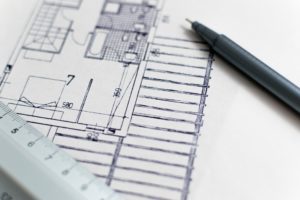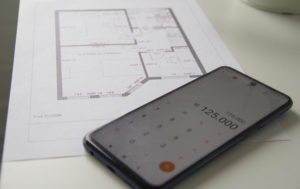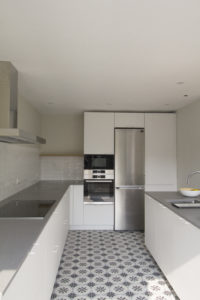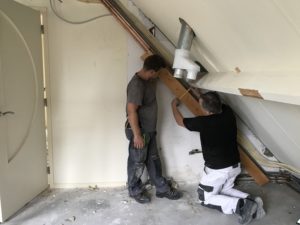Renovation of a home is a complex and time- consuming task which often takes unforeseen turns and is felt by many as a very stressful experience. Should you be an ex-pat, then the undertaking of a renovation is all the more daunting, as you have not got a network of contacts and have no prior knowledge of the host country’s regulations.
One of the unique qualities we bring to our customers is our understanding of your position. We are qualified and experienced architects who have first-hand experience of rebuilding our own homes as an ex pat and call on these experiences in our professional work to help our clients.
As practicing architects with many years of experience we regularly hear of and from people who have made fundamental mistakes when embarking on a home improvement scheme. To help you avoid difficulties and make a good start with your project we’d like to share with you the 10 most common mistakes people make.
1.- Not hiring professional advice from the outset.

Starting a renovation in the Netherlands without professional advice is like taking a giant leap into the unknown. Which companies are reputable and how do they work? What are the possibilities and the potential that our house offers? Which requirements do we need to consider to avoid legal problems when renovating? How can I achieve a renovation in the most cost-effective manner? Having professional advice will simplify your search to these answers.
2.- Not knowing the building regulations of your adopted country.

Buying existing houses, often built in the last century, predominate in the Dutch housing market. The renovation work on such properties is often more complicated than perceived by the owners. Once work has started, they discover more work needs to be done than just an aesthetic makeover. At this stage it is important to have a thorough understanding of the Dutch construction industry from the materials available to the specific distribution of tasks in the sector. Without this information you could face unforeseen situations and additional costs.
3.- Not acquiring the correct building permits.

The Netherlands is the country of regulations “par excellence”! Requesting the correct paperwork and submitting it on time before work commences is mandatory. Not complying with building regulations will incur fines and delay the progress of a project. A professional will know which permissions are required and will handle the paperwork for you.
4.- Not having a detailed and thorough plan.

Drawings and technical documents are essential when carrying out a complete refurbishment, having an idea conveyed verbally and supported by pictures is not sufficient. Be aware that many different parties are involved at any stage from the contractor to the City or Town Council. Making decisions as you go along complicates everything. The best course of action is to have a well thought out and highly detailed plan at the outset, to which all parties can refer and work from. This will avoid misunderstandings and subsequent delays.
5.- Not having estimated a realistic budget for the work.

Estimating the costs of a renovation is not an easy task without being familiar with aspects of construction such as procedures, materials, or guarantees; prices for labour, for example, can differ greatly from those in your home country. Taking the advice of specialists is the most cost-effective means of achieving the nearest thing to your dream renovation within your budget.
6.- Not having contacted a contractor well in advance.

Contractors in the Netherlands usually work with a fully booked diary 6 months in advance and are not very accessible to private clients. Working with specialized advisers that have an established business network of reliable contractors would help you find the right company for your renovation, guaranteeing the quality of service and reducing the waiting time.
7.- Do not hire your contractor merely on the basis of the cheapest quote.

In order to choose the best contractor, it is necessary to understand the technical language to enable correct interpretation of an offer. As there is no standardized way of presenting a quote from builders it is very difficult for a lay person to compare quotes. Hiring the contractor with the cheapest quote is not always the wisest choice. Low quotes can be achieved by using inferior quality materials or incorrectly quoting which would lead to increased charges mid build or leaving the project unfinished.
8.- Not having chosen and purchased materials in advance.

The contractors in the Netherlands take for granted that the client purchases the kitchen furniture, bathroom fixtures, some wall and floor finishes as well as colours for painting, before the work starts. As suppliers here have a delivery time of anything between 4 to 12 weeks after the purchase, it is crucial to plan purchases sufficiently far in advance to avoid delays.
9.- Not having anticipated the supervision of work or at least the supervision of the critical milestones.

Even when the project is well documented, it requires periodic on-site supervision to check that the technical and aesthetic aspects have been carried out correctly. This avoids execution errors and misinterpretations, especially important towards the end of the build when personal preferences with the final details come strongly to the fore.
10.- Not having provision to cover extra expenses.

Additional costs are almost unavoidable no matter how careful the planning. Once you start to demolish a beautiful 30’s house unforeseen problems can occur due to the age of the building. It is also common for you to change your mind during the work, and this will incur extra costs. For these reasons be realistic and always allow slack in your budget.
Are you planning a renovation? A+A Interiors have the expertise to help you.
Contact us by pressing the button below
CONTACT NOW A+A INTERIORSAll rights reserved © A + A Interiors




